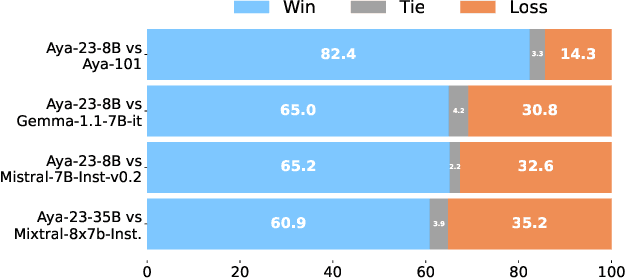Dwarak Talupuru
Command A: An Enterprise-Ready Large Language Model
Apr 01, 2025



Abstract:In this report we describe the development of Command A, a powerful large language model purpose-built to excel at real-world enterprise use cases. Command A is an agent-optimised and multilingual-capable model, with support for 23 languages of global business, and a novel hybrid architecture balancing efficiency with top of the range performance. It offers best-in-class Retrieval Augmented Generation (RAG) capabilities with grounding and tool use to automate sophisticated business processes. These abilities are achieved through a decentralised training approach, including self-refinement algorithms and model merging techniques. We also include results for Command R7B which shares capability and architectural similarities to Command A. Weights for both models have been released for research purposes. This technical report details our original training pipeline and presents an extensive evaluation of our models across a suite of enterprise-relevant tasks and public benchmarks, demonstrating excellent performance and efficiency.
Rope to Nope and Back Again: A New Hybrid Attention Strategy
Jan 30, 2025



Abstract:Long-context large language models (LLMs) have achieved remarkable advancements, driven by techniques like Rotary Position Embedding (RoPE) (Su et al., 2023) and its extensions (Chen et al., 2023; Liu et al., 2024c; Peng et al., 2023). By adjusting RoPE parameters and incorporating training data with extended contexts, we can train performant models with considerably longer input sequences. However, existing RoPE-based methods exhibit performance limitations when applied to extended context lengths. This paper presents a comprehensive analysis of various attention mechanisms, including RoPE, No Positional Embedding (NoPE), and Query-Key Normalization (QK-Norm), identifying their strengths and shortcomings in long-context modeling. Our investigation identifies distinctive attention patterns in these methods and highlights their impact on long-context performance, providing valuable insights for architectural design. Building on these findings, we propose a novel architectural based on a hybrid attention mechanism that not only surpasses conventional RoPE-based transformer models in long context tasks but also achieves competitive performance on benchmarks requiring shorter context lengths.
Aya Expanse: Combining Research Breakthroughs for a New Multilingual Frontier
Dec 05, 2024



Abstract:We introduce the Aya Expanse model family, a new generation of 8B and 32B parameter multilingual language models, aiming to address the critical challenge of developing highly performant multilingual models that match or surpass the capabilities of monolingual models. By leveraging several years of research at Cohere For AI and Cohere, including advancements in data arbitrage, multilingual preference training, and model merging, Aya Expanse sets a new state-of-the-art in multilingual performance. Our evaluations on the Arena-Hard-Auto dataset, translated into 23 languages, demonstrate that Aya Expanse 8B and 32B outperform leading open-weight models in their respective parameter classes, including Gemma 2, Qwen 2.5, and Llama 3.1, achieving up to a 76.6% win-rate. Notably, Aya Expanse 32B outperforms Llama 3.1 70B, a model with twice as many parameters, achieving a 54.0% win-rate. In this short technical report, we present extended evaluation results for the Aya Expanse model family and release their open-weights, together with a new multilingual evaluation dataset m-ArenaHard.
Procedural Knowledge in Pretraining Drives Reasoning in Large Language Models
Nov 19, 2024



Abstract:The capabilities and limitations of Large Language Models have been sketched out in great detail in recent years, providing an intriguing yet conflicting picture. On the one hand, LLMs demonstrate a general ability to solve problems. On the other hand, they show surprising reasoning gaps when compared to humans, casting doubt on the robustness of their generalisation strategies. The sheer volume of data used in the design of LLMs has precluded us from applying the method traditionally used to measure generalisation: train-test set separation. To overcome this, we study what kind of generalisation strategies LLMs employ when performing reasoning tasks by investigating the pretraining data they rely on. For two models of different sizes (7B and 35B) and 2.5B of their pretraining tokens, we identify what documents influence the model outputs for three simple mathematical reasoning tasks and contrast this to the data that are influential for answering factual questions. We find that, while the models rely on mostly distinct sets of data for each factual question, a document often has a similar influence across different reasoning questions within the same task, indicating the presence of procedural knowledge. We further find that the answers to factual questions often show up in the most influential data. However, for reasoning questions the answers usually do not show up as highly influential, nor do the answers to the intermediate reasoning steps. When we characterise the top ranked documents for the reasoning questions qualitatively, we confirm that the influential documents often contain procedural knowledge, like demonstrating how to obtain a solution using formulae or code. Our findings indicate that the approach to reasoning the models use is unlike retrieval, and more like a generalisable strategy that synthesises procedural knowledge from documents doing a similar form of reasoning.
Aya 23: Open Weight Releases to Further Multilingual Progress
May 23, 2024



Abstract:This technical report introduces Aya 23, a family of multilingual language models. Aya 23 builds on the recent release of the Aya model (\"Ust\"un et al., 2024), focusing on pairing a highly performant pre-trained model with the recently released Aya collection (Singh et al., 2024). The result is a powerful multilingual large language model serving 23 languages, expanding state-of-art language modeling capabilities to approximately half of the world's population. The Aya model covered 101 languages whereas Aya 23 is an experiment in depth vs breadth, exploring the impact of allocating more capacity to fewer languages that are included during pre-training. Aya 23 outperforms both previous massively multilingual models like Aya 101 for the languages it covers, as well as widely used models like Gemma, Mistral and Mixtral on an extensive range of discriminative and generative tasks. We release the open weights for both the 8B and 35B models as part of our continued commitment for expanding access to multilingual progress.
 Add to Chrome
Add to Chrome Add to Firefox
Add to Firefox Add to Edge
Add to Edge